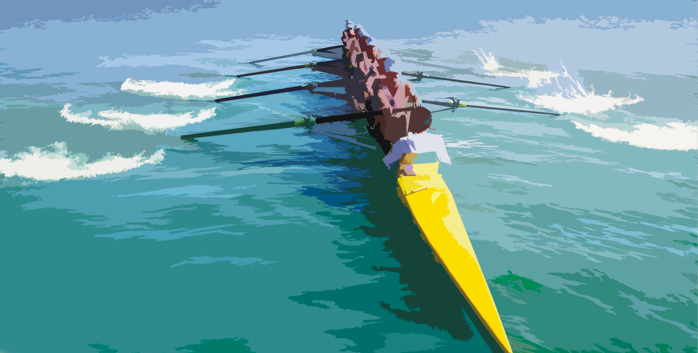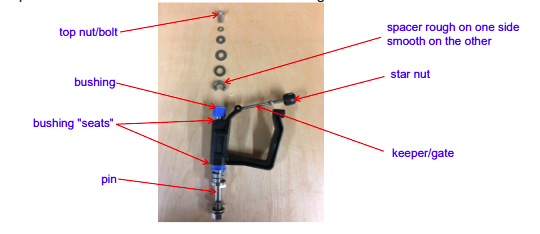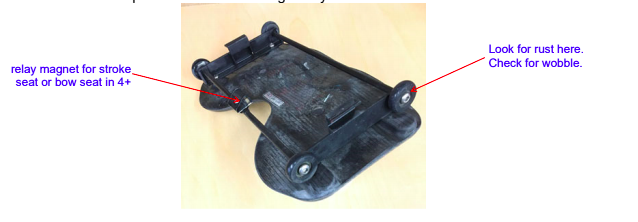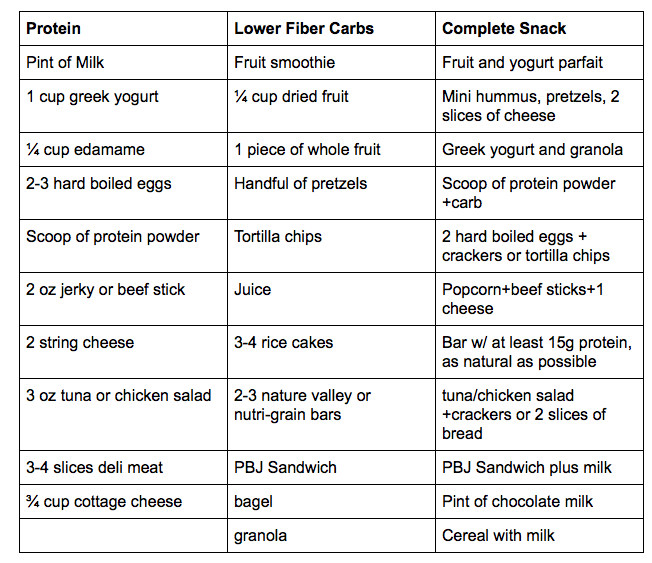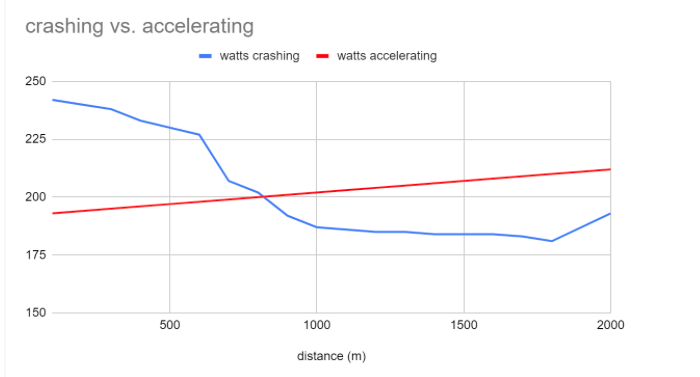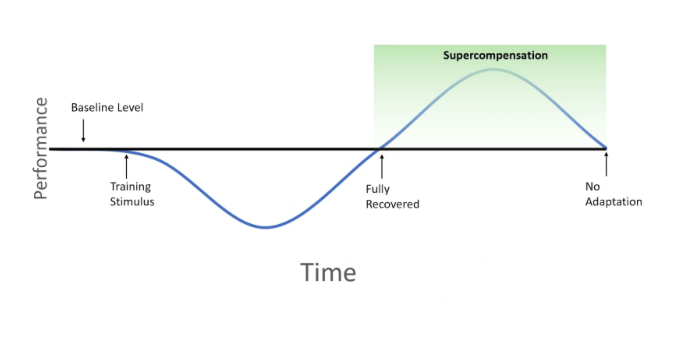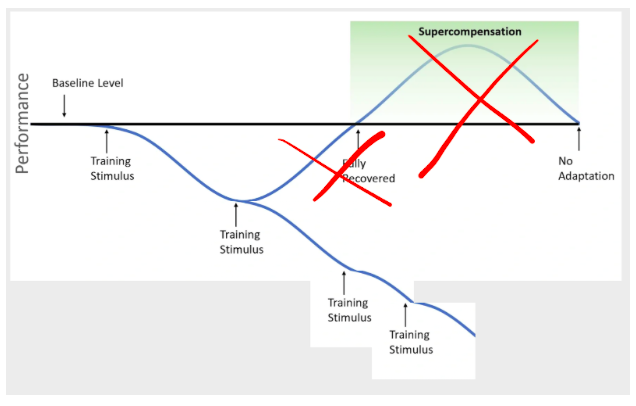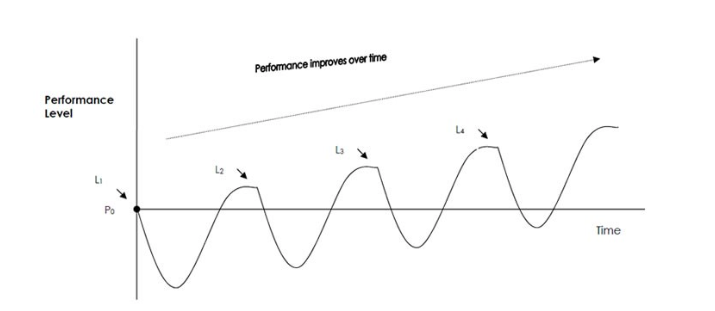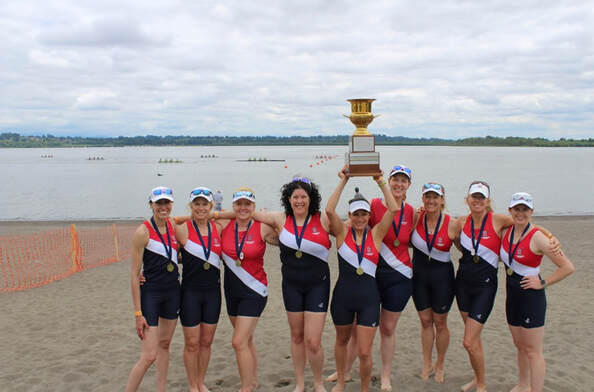|
By Liza Dickson
While it isn’t everyone’s favorite thing, it is a huge benefit that taking turns in the coxswain seat is the norm at SRA. I have worked at several clubs that struggled to find coxswains and were not willing to take this on. I ended up coaching A LOT of masters’ practices from the coxswain seat. Here are some basic tips that I think will help everyone out, or at least ease some anxiety the next time you are in the coxswain seat. The first thing I talk about with anyone before they cox is their priority list of responsibilities:
Number 1 and Number 2 are so important to me that I usually do all the commands for my new coxswains when possible. That way they can focus on safety and steering. While that may not be possible as you jump into the seat, don’t worry about complicated commands and motivation until you feel comfortable with safety and steering – especially if it’s dark. Rowers may be rowers, and put some pressure on you otherwise, but remember your first two priorities! Thanks to Matt and Ethan who helped me compile the list. As you all know, every coach is different. We tried to stay with general tips that most coaches feel are important. GENERAL TIPS
SAFETY
STEERING – it takes practice!
COMMANDS
MOTIVATION – once you have a handle on all the above, you can start some motivational calls.
Dear Rowers,
Over the past two months, we (human beings) as a collective have experienced a significantly traumatic and ever-changing period of time with COVID-19. You may have noticed that since this has taken place that you are more irritable, hypervigilant, stressed, experiencing more anxiety, less sleep, and a decreased (or increased) appetite. Some of you may have been navigating through these things prior to the pandemic, but for some these sensations and feelings may be relatively new and overwhelming. I just want to encourage all of you who are reading this, that there is no right or wrong way to handle or cope with this experience, there is solely just being in it and trying to move through. “What does that even mean? Just being in this and trying to move through?” Think about the first time you took a stroke on the water, for the majority of you that meant you didn’t drop it in at the right time, or it wasn’t turned to the correct degree and you didn’t catch the water. Remember those emotions and how frustrating it was to be in that position and be unsure of to make your body do what your mind was saying. Fast forward to your 10,000thstroke, you no longer need to think about what you need to do to make your oar drop just right, it just happens, you feel it in your body. That’s what I mean when I say just be in this. Allow yourself to experience the feelings that are coming up, remember they are temporary (just like your inabilities and feelings of frustration in the beginning of this sport), and then express them in a safe way. Unfortunately, I cannot provide answers to when this will “end” and I can acknowledge that at times that thought alone can be overwhelming and terrifying. But here’s another way to look at this pandemic: you’re in a single and you’re halfway through your race when you start to feel like you can’t or won’t make it to the finish line, your aching body screaming that you can’t do it. But somehow you do and you’re a stronger rower and human at the end of the race because you kept going. Although we don’t have a finish line in sight, we do have our own resilience and drive that we can tap into to help us feel like we can make it through. For many of us, rowing brings a sense of community, belonging, love and support; and now, all of those things have been stripped away or feel like they have. Just being we cannot physically be together in a boat or on the ergs, we can still remain connected. Creating a Zoom workout group with the other rowers in your boat or on your team, holding each other accountable like your coaches would, reaching out to one another via text when you start to miss the connection, email your coaches for resources to share with your other team members, utilize the technology you have to keep that community alive! Numerous regattas have been cancelled, events postponed, fundraisers shut down, and so many other aspects of this sport and lifestyle have been impacted. There is an element of grief to having all of these exciting events cancelled, the hope that you had to prove yourself on the water, the medals and awards that were possible, and for the seniors, some of the last moments with your team and as a high school rower. I’m encouraging you to allow yourself to grieve those moments, but to remember that there are still infinite moments in the future that you will have. Just because you couldn’t experience some of these present times, it does not mean that you are not a rower, and it does not make you any less of a rower. Grief doesn’t look the same for everyone, it can manifest as anger, frustration, irritableness, nausea, fatigue, insomnia, etc…So if you are experiencing any of these, there may be a need to allow yourself to recognize that you feel a loss and to work through that. You’ve lost before at regattas, on the erg, on the water, you know how to handle this, you just have to believe that you can. This has allowed time for you to develop more of the mindset of a rower without the physical rowing. Can we use this time as an opportunity to build a stronger mind and body to help us return back to the sport better than ever before? For parents: I just want to acknowledge that I know this is a very challenging time for you as well, but I am going to encourage you all to help provide a space for your children to experience, feel, and process through their emotions during this time. For some of you, you may have lost your job, which is what your child now feels like, they have lost their purpose, their meaning, their routine. Many of you were not prepared for this, which is a place where you can find empathy for your child who also did not have time to prepare. Some ways to help communicate with your child and to encourage them to express themselves: a) setting up a journal system where your children can write in a journal and leave it in a specific place in the house for you to read and respond (if communicating verbally is anxiety provoking or distressing for the child), b) spending time discussing your own worries and fears (to an appropriate extent) to help normalize that they are not alone in their feelings, c) helping them create a flexible routine or schedule where they choose the tasks they want to get done for the day but may not necessarily need a time frame to do it in (less anxiety provoking and defeating if they can’t complete something), d) creating conversation about the present moment and how to stay mindful in that and then practicing those strategies (breathing together, yoga, meditation). Sleep is one of the most important things that we need as a human being to help heal ourselves and to just function on a daily basis, so if you recognize that your child is not sleeping well or just not sleeping in general, this may be an indicator that they are trying to navigate some of the things mentioned above. They are strong but they need you to help guide them through this, and it’s okay to let them know you are also navigating this for the first time. Our mental health is just as important as our physical health. You all know how to work your bodies, let’s use this time to connect with our minds and building an overall stronger self. There is no mandated timeline for your progress, as long as you as continuing to work towards your goals, you are doing it right. Please reach out for support when you need it, you are not alone in this, we are a team! All the light, Dr. Jessica Reyka Bio: Dr. Reyka is a psychologist in the Denver area mainly working with young adults and adults in navigating their healing process through complex trauma, significant anxiety, and attachment issues. She utilizes a holistic integrative approach where she focuses on the mind-body-spirit connection, often referring clients to massage therapy, acupuncture, and yoga to help facilitate a more thorough and comprehensive healing journey. Connection to rowing: She began rowing while pursuing her undergraduate degree and then went on to coach middle school athletes. She has faced some of the same challenges on the water and can understand the intense personal connection to the sport. Check Your Seat Yes, I’m anxious. It’s time to check my seat before the race. I’m anxious because I’ve experienced some lapses of focus thinking more about the race than being in the moment. How about the time we were launching the pair after re-rigging it from a double? Boat’s in the water, teammate hands me my oar and as I go to put it in the open oarlock...”for crying out loud!” It’s a sculling rigger! I’ve got a routine now and this is what I do before every race - because this is what I do before every practice. Check the rigger: • All the nuts and bolts at the boat and all the backstay fasteners. Two fingers tight, great. • Top nut at the top of the pin three fingers tight, perfect. • Bushings at the oarlock seated all the way down? If not I squeeze the oarlock up and down. Then spacers. Is the oarlock too loose, do I need another spacer? Perhaps I can just flip one over and the oarlock will move well enough for Goldilocks. Check the foot stretcher:
• I move it to my customary position. Did I get it perpendicular to the gunwale? Yup. Is it seated right? I push and pull on it and it and it drops into the notch. I tighten the wing nuts again. I hate it when I don’t do that. Just when you jump on the stretcher the whole thing shifts. • Shoes at the right height and secure to the plate? • How are my heel ties? Rules require 3” and boy do I need that with my stiff ankle joints. Oh not again the zip ties have been tightened so much I can barely lift my heels and when I do my heels come out of the shoes or the heel lifts and the sole of the shoe departs from the body of the shoe! I have spare 11” zip ties that should work and I know that at least 3-4 fingers across my hand width is about 3”. Cut replaced and done. Check. • Almost forgot to check the 3 stretcher tracks that are attached to the boat that the foot stretcher slides in. I wiggle them and they’re tight and not missing any sections. Awesome. Thank goodness cuz I don’t have a small adjustable and phillips head screwdriver in my kit. Better get ‘em. Check the tracks: • First I wipe them down. That always calms me down. Hmm, looks like they aren’t even at the front stops and one of them is loose up and down. I reach under the tracks at the front and near the back under the deck and feel for the wing nuts; there are two for each track. Ah, found them and loosen the ones on the out of alignment track, tight little buggers, slide the track in place and tighten them back up. Sweet. Check the seat: • First the wheels. Is the seat rolling smoothly? Cool. Maybe I should push down on it while I roll it; I have put on a few pounds. It’s making a grinding noise. I check the wheels to see first if there is a rusty color around any of them while I’m cleaning them. Are any of them wobbling side to side? Especially the one with rusty color. Yup that’s the culprit. The bushings are failing. Where is that boat guy when you need him? I should have written it on the repair log last time. • I make sure I put the seat back the right way! Ok boat’s ready to go. I’ve already checked my oar, well at least the ones I took down. • The grips are tight and wiped down. • The collars are not broken and they aren’t crooked. I’m ready to row. I can’t blame the equipment now. Oh well there’s always the cox. We’ve shoved off. While I’m setting the boat I reach out and double check that the star nut at the end of the keeper/gate is seated and tight. Nothing like that popping open and the oar coming out of the oarlock – now that’s a very weird feeling! Time to do the work. Oh about that pair race. We swapped out the rigger and made it to the start – pretty frantic, rowed the race at a 39 and that’s about all I recall. -Coach Simon Pre-Practice Snack Ideas Everyone is different when it comes to what they can digest or tolerate for a pre-practice snack. The key to all of it is timing. Use the guidelines below to select an appropriate pre-practice snack for the amount of time you have before practice to make sure you are fueled for the work ahead. It may take some trial and error to see what works for you. Choosing “real” food instead of overly processed food is preferred. Try to pick things closest to their natural form, or with a short ingredient list.
Source: USOC/USROWING Sports Nutrition Dept.
Finding Motivation to Train in a Time of Covid
One of the most common frustrations I have heard during this crisis from athletes of all ages, both from SRA and beyond is: “I don’t have the motivation to train without races and without my team. What do I do?” I want to highlight three words in this statement – motivation, races and team and discuss them further. The first thing I want to address- there are races in your future! I know you don’t know exactly when, but you will race again. When that race day arrives, will be you be ready for it? And what does ready look like? Probably a little different for everyone, and maybe different than it used to for you. Yes, your overall focus should be around getting back to racing and being prepared for it, and for some people that may be maintaining the same rigorous training plan that you always do. But that may not be true for everyone. And, if you are guilting yourself for not doing enough, it’s not going to help your motivation. Since we don’t have an exact target date for your next race, it’s ok that racing is not the focal point of your training plan right now. It’s ok to take some time away from structured, metric based workouts and instead find ways to be active that bring you joy. That will help you be more motivated to train seriously when the time comes and to serve your general mental and physical health in a better way. Make sure you give value to whatever workout you do, versus telling yourself you haven’t done enough. Release yourself of the pressure to prove something to anyone other than yourself each day. Second, you still have a Team! Unfortunately, you just don’t get to see them every day. For me, I didn’t need to see my teammates every day to be motivated by them. The main reason for that was the trust that we all had in each other. Success on a rowing team is reliant upon deep trust between all members of the crew. We all must trust that everyone is going as hard as they can always. This trust is forged through countless hours of practice on land and in the water. It comes from suffering side by side. While we can’t do that right now, we DO have all the past experiences that built that trust between our teammates and ourselves. Now is the time to lean on that. When you can’t be with your teammates every day, you must trust they are continuing the work as they are trusting you to do the same. When I had workouts to do on my own, and I wasn’t really motivated, I just would remember that I had a responsibility to my teammates to do the work, whether we were side by side or not! Motivation is a thread woven through having races in the future and having teammates to train with. Both races and teams have something in common – they are external drivers. They are things beyond you that help to motivate you. We all also have internal drivers as motivators. Psychologists used to think that people were one or the other, but the reality is we all rely on both external and internal drivers for motivation. Right now, two major external drivers have been removed as motivators. Now is the time to explore and depend on your internal driver to keep you motivated. This is the time to pause to remember the other reasons that you love to row, especially the very personal reasons that keep you coming back. Rowing is too hard to ONLY pursue because of external reasons. My sculling coach used to say that in order to row everybody has to have a spark inside them. His job was to throw some gasoline on that spark to motivate us further, but we all had to have that internal spark. Now is the time to find out what that spark inside you is, and let that internal driver be your source of motivation to continue to train in whatever capacity that works for you. Connected to why you row is your definition of yourself as an athlete/rower. Whether you think about it or not, we are all doing many things everyday that contribute to our definition of ourselves as a rower. While you aren’t racing or with your team, two things that may be central to your definition of yourself as an athlete, focus on doing things everyday to reinforce your definition of yourself as an athlete. While I would hope this includes some training of some kind, this isn’t JUST training: it’s getting the sleep an athlete needs; focusing on the nutrition you need as an athlete; drinking enough water. You get the idea. Find a way to call yourself an athlete every day so you stay in touch with that version of yourself even as we don’t practice as a team. There is an opportunity here. I know that not everyone can find opportunity in times like these and I certainly can understand that. It’s a hard time. But, with a pause on racing, this is a time we can re-set. We can choose to re-define our goals and objectives, to be a different athlete, to commit to something new. In addition, we can also just choose to be a stronger version of the athlete and teammate we already are, re-affirming the goals and objectives we have set, with just a slightly different timeline. Either way, take advantage of this pause to check in with your goals, and revise or reaffirm. I hope I have given you some ideas to connect with why you row beyond your team and racing, and hopefully some motivation as well. I’m always happy to chat with any rower about goals, why they row and motivation. Coach Liza The quote “Don’t promise when you are happy, don’t reply when you are angry, and don’t decide when you are sad.” -Ziad K. Abdelnour is often thrown around to imply that intelligent and logical people often make unwise decisions based on emotion. I’ll add “Don’t grocery shop when you’re hungry and don’t make a race plan in the middle of a race” because no, of course I don’t need the ice cream and the donuts, and no, of course backing off to “save for the sprint” isn’t going to get me to my goal. Why should you have a race plan? What does having a race plan mean? And most commonly, what is the best race plan? Often I’ve gotten these questions just before or even during the warmup on 2k day. It’s a desperate rower’s hail-Mary, the hope that “there must be a key, some secret that if I can learn and execute will unlock the mystical erg test.” By then it’s too late to teach - too late to equip the rowers to answer those questions, so at that point I’ll give an example race plan, and if they’re lucky, they’ll have a relatively recent score to use as a starting point and we can craft a serviceable plan on the fly. But here in writing, when we have the luxuries of ample time and of logical thought, when we’re several stages removed from the heightened, anxious state that exists pre-erg test, here we can go into how and why to build an effective race plan. If there were such thing as a best race plan, then this wouldn’t be much of an article. Alas (or perhaps thankfully?) rowers will encounter different circumstances that require different race plans, and rather than try to prescribe a plan for every eventuality, we’ll lay out how to build your race plan based on your circumstances. “Why” to have a plan is summarized in the first paragraph - if you have no plan, then you’re going to fall back into emotional decision making. In the middle of an erg test or race piece, while the lizard-brain is elbowing in on your logical self with cries of “stop this madness!” is not the time to plan anything at all, let alone how hard you want to keep working for the next couple minutes. Circumstance 1 - “I don’t really know what I should aim for” This happens to novices, athletes coming off a long injury, or rowers who have come back to the sport after years off. If this is you, then, as soon as you can, get out of circumstance 1 - figure out what to aim for! How to do this? There are lots of “predictive workouts” (6x500, dirty dozen, 4x1k, etc), but in Philosophy of Science Norbert Wiener suggests that “The best material model of a cat is… the same cat” and I tend to agree. If you’re prepping for a 5k, do a 5k, if you’re prepping for a 2k, do a 2k. In fact, do several, because that’s the best way to simultaneously find an appropriate pacing and eliminate the foreboding that can accompany the erg test. Bear in mind that doing several 2ks isn’t “training” for a 2k, rather it’s a way of finding your correct pace. If you’re in this category, don’t get bogged down with an intricately detailed race plan, because at this point you’re just turning the coarse adjustment knob to get your pace somewhat in-focus. This is also where the “fly and die” has some value. While fly and die is not a good strategy for athletes who are trying to optimize and shave off 1 more second, for those who don’t know their pacing, it helps to “find your edge” if you’ve seen it from both sides. Circumstance 2 - “I have a goal, but how do I get there?” NOW, we can start building a race plan around something meaningful, and here are some questions to consider. What do you want your pacing to look like? Do you want to just hold steady for the bulk of the piece, or start 1-2 splits higher and work it down to -2/-3? Do you want to break it down by 500s/400s/300s and “castle” around your target average. Any of these are valid, but my usual prescription is to start a little slow, and accelerate throughout the piece. I like to think of it in terms of the percentage of the piece that is uncomfortable - see the charts below for a hypothetical comparison. The red line is a rower who paced to accelerate throughout the piece and the blue line is a rower who came out too fast (by about 7 splits) and then crashed. Both rowers wind up with the same time, but the blue rower is miserable starting at about 600, while the red rower probably gets uncomfortable around 800, but isn’t truly miserable until about 1200! What a savings! The red and blue examples are hypothetical, but are meant to trace more or less what a well paced, and poorly paced 2k could look like.
In general, the more you know about where you’re aiming, the more precise and tighter your pacing should be, for example: you’ve only done one 2k this season and it was 2 months ago? You could aim for +3/+0/-3/-(6+) over each 500, but if you’ve done several and you’ve got a pretty tight grouping, maybe you go for +1/+0/-1/-2. These are just examples, and I want to emphasize that the details of the plan aren’t as important as committing yourself to it- whatever it is. The Sprint - over the last ~15% or so you want to start committing a little harder, pushing deeper into the hole, so that by the last 20ish strokes, you’re going flat out. Use all the tools at your disposal here - pressure, rate, tech (efficiency). If your last 10 flat out strokes are just a couple splits below your average, or even if you crash in the last 5 and the split starts to climb, then you paced pretty well, but if your last 10 are wildly faster than your average, then you know you underestimated your capabilities, and you’ll want to try again and pace a little faster to home in on your hypothetical potential. Takeaway: build your race plan well in advance, Design it logically based off of previous (ideally recent) scores. If you don’t know where to aim, there’s nothing like the real thing to give you an idea. Consider: What is training? Your first thought is probably that training is the act of working out, probably repeatedly. Maybe it’s taking a 30 minute break from your job to do a core circuit, or maybe it’s going on a 16 mile run on Saturdays. Maybe it’s rowing for 2 hours three times a week, or maybe it’s rowing for 12 sessions a week as you try to make the national team. What is a training plan? Chances are, it makes you think of some sort of cycle or calendar, with workouts of varying intensity and duration spread throughout. And depending on how serious or experienced of an athlete you are, the more workouts you’ll have and the harder they’ll be. Seemingly, a training plan is just a list of workouts arranged throughout the week (or month, or day, or year). Alas, this conception of training and training plans is incomplete. A fuller picture of training needs to consider a number of factors, including nutrition, hydration, injury prevention, and--crucially--recovery, which we’ll focus on here. So let’s be clear: A hard workout will never make you faster on its own. Working out doesn’t improve your performance; recovery after a workout does. Adaptation to a physiological stressor occurs while you are in recovery. Quite literally: you become a faster rower during the periods of time when you are NOT working hard! If you want to engage in a well-rounded, effective training program, the recovery period is equally as important as the exercise stimulus. Let’s walk through the graph above: 1. Baseline Level This is pretty obvious. It’s basically how fast of a rower you are right now, prior to a workout. 2. Training Stimulus This is the workout itself. You stress your body in some way. Maybe it’s crazy hard sprint pieces; maybe it’s a long, light steady state piece. You tax the various energy systems in your body and the immediate effect is to actually get slower. 3. Recovery Period This is where the magic happens. This is when your performance sinks below your baseline level for an extended period of time; the entire time when the curve dips below the horizontal line in the graph. If you do 12x500m on the erg, and 12 hours later I ask you to pull a 2k--you probably won’t PR, because your body will not have fully recovered. During this time, your body undergoes a number of physiological adaptations as it replenishes your energy stores, repairs muscle and tissue tears from the workout, and improvements at the cellular level (i.e. increasing the density of mitochondria). Fundamentally, this is the period during which your body is actually adapting and improving. If you don’t let yourself properly recover from a workout, you’ll never get faster. 4. Supercompensation At a certain point, your performance level continues to creep up and up, until you’ve surpassed the initial baseline level. Congratulations--your body is now in supercompensation! You’re officially a faster rower than you were before the last workout. This is the best time for you to apply another training stimulus and repeat the process all over again. Performance Over Time If you don’t allow for proper recovery, your performance over time could look something like this (exaggerated) graph. Your performance level continues to sink, and in spite of numerous hard workouts, you are only getting slower! Bummer. With a properly executed training program, you can recover properly between workouts. Then, when your body is in the supercompensation period, your current performance level is higher than the baseline level. If you apply a training stimulus now, you will undergo another recovery period and come out the other side even faster! Keeping Track of Recovery
How do you use this information to be a better rower? Well, it’s important to keep track of your recovery process with a training journal. This will help you notice patterns in your recovery that can inform important decisions in your training. For instance, you may notice that anytime you do a good hard Anaerobic Threshold workout, the next day’s session is always subpar, no matter what it is. This is an indication that your body might need two days to recover properly, and the day after AT would be a good chance for a light session, or no session at all. It’s also a good idea to keep track of stressors outside of rowing, since those can play an important role in recovery. Record how much sleep you get. Make a note of how much you have going on at work or school. Consider repeated, stressful social situations. A busy week at work might be a good opportunity to have a lighter week of training, since your body might be less able to recover quickly. But without a training journal where you can keep track of your workouts and the factors that impact your recovery, you won’t be able to notice these patterns. Keeping a Recovery Journal In addition to keeping track of your workouts, try adding in some extra information. Here are a few basic questions to get you started. If you rank each question 1-10, then you can formulate a “recovery score” for yourself. You don’t have to answer these questions every single day--just once a week will be enough to start noticing patterns. This is also not an exhaustive list of stressors that can impact your recovery, but try it out and see if it helps give you a more complete picture of your training. How many hours of quality sleep do you get each night? How well have you been hydrating every day? How well have you been fueling with proper nutrition? Do you have adequate downtime during the week to relax? How much emotional stress have you experienced this week? How busy are you with work/family/school? Conclusion While it’s easy to get caught up in the workouts, a complete training program has to consider recovery as an essential component to improving over time. Adding more and more, harder and harder workouts will not necessarily improve your performance. Physiological, psychological, and technical adaptation actually occurs during the recovery period after the stress of a workout, so without adequate recovery, additional sessions won’t yield additional speed. Fundamentally, recovery is as important to training as the workout itself. These past few weeks in almost totally isolation have felt incredibly long. SRA has been proud that our community has listened to the orders of local and national officials in regards to staying home, limiting exposure to others, and helping flatten the curve so our communities can recover from COVID-19. However, extended time at home has been a challenge for many. While some people are finding extra time to get house projects completed, extra work done, and time with family squeezed in- for others this lockdown has seemed to drag on much longer and has caused a lack of motivation.
The importance of keeping a consistent and productive schedule is more important than ever. Creating some sense of normalcy (while in your own home) is important for your mental, physical, and emotional health. Read below some tips on how to keep your life more manageable and structured. Stay safe, stay healthy, and stay home! Singles During COVID-19 If you are single and living alone during this time it will be incredibly important to work a little harder at maintaining a healthy and realistic schedule during your days to keep your occupied. You need to self motivate! What you lack compared to other people is access to just that... people. Even though you probably have plenty of friends and family you could see, you are being a responsible citizen (as well as adhering to local laws) and are not coming in contact with friends of family to protect yourself as well as them. To maintain contact with friends and family, write down a list of those you really want to stay connected to or catch up with. Mom, dad, sisters, brothers, best friend, book club buddies- you name it. Reach out to them to schedule phone calls, zoom chats, or other audio/visual ways to connect. To make your conversations even more fun, try playing games together. Jackbox Games is a great online gaming platform that provides fun, and often really funny games for you to play on your phone or computer with people you know all over the world. Check it out HERE! (Quiplash is my favorite game) Here are some other things you should be sure to work into your schedule:
Couples During COVID-19 Married or unmarried couples living together are getting the ultimate relationship test of a lifetime! As much as we love our SO, for some, so much time together can be a little taxing if you're used to or enjoy some time alone. It is key to have a conversation with your partner about your boundaries, needs, and expectations during this time together at home. Sit down with your partner and have a conversation where feelings are left aside so you both can honestly talk about the best approach to this enhanced time at home. For others- this isn't as much of a problem. Perhaps both of you really enjoy constant companionship or interaction so this extra time at home is a blessing- good for you! Either way- no relationship is better than the other. Different people have different needs so it's important for both types of couples to still have a chat about home life. For couples, you can use the suggested bullet points from Singles During COVID-19 to plan a productive day, but you might want to add a few other items. For example, feel free to add some of the bullet points below to your daily schedule:
It is also important to keep in mind that there has been a rise in domestic abuse reports in recent weeks. If you find yourself in an abusive relationship please reach out to a trusted family member or contact the National Domestic Violence Hotline. Families During COVID-19 What a wonderful time for extra family time! A few of you may have just rolled your eyes, and I totally understand where you are coming from, but my main advice here is to try as be as positive as possible. Compared to singles and couples right now, you've got quite a few extra bodies in your household making messes, getting in the way, possibly making demands, and much more. Take a deep breath- you can and will survive! The single most important thing for families quarantining or staying home together is creating a schedule and having structure. Making sure that schedule communicated clearly and adhered to is also important. Make sure this schedule is realistic and allows for some wiggle room. You and your spouse or the adults of the household need to work together as a team, especially when handling children. Create a schedule for the kids first, and then create your own schedule around theirs. As much as you want to sleep in, waking up earlier than the kids can give you more time together as a couple, to squeeze in a workout, or just prepare yourself for the day. Set an early alarm. For the kids- try to sympathize with them. They have tons of energy usually taken up by school and activities. Now they are stuck inside. Give them a disciplined schedule and have them help with household tasks too! Kids schedules can look like the following:
Every family's schedule will look different, but make sure there is one written down. Write it on a white board or a poster and place it for everyone to easily see. You can even let your family help make it and add cool stickers, bright colors, and fun patterns to it. Again, parents should work as a team- possibly splitting supervisory duties so each adult can get work done and their own time away from their beloved children (hey, mental health is important folks!). Try to start each day with clear communication on who is doing what. Keep a positive mindset about using this time to strengthen your bonds as a family and make some memories. For older children, keep in mind that a schedule is also important. Don't let them take off on their own simply because they are driving you a bit nuts. Teens and young adults have been congregating in parks and other public areas which is only more of a danger to themselves and others. Older children are capable of helping out more around the house with cleaning, yard work, cooking, and more. You might get a few initial groans, but communicate to them how much you appreciate their help during this time (and that as long as they live under your roof they do what you say!). For tips on working from home CLICK HERE. For professional advice on parenting during the pandemic, CLICK HERE. Family activities to do during COVID-19. In Summary You've got this. Create a schedule, stick to it, be easy on yourself for mistakes or frustration, look on the positive side, stay in touch with loved ones, and use this time at home as an opportunity as opposed to a jail-sentence. Remember that staying home is the least we can do to hep our communities get through an incredibly tough time. Every day at home is one step closer towards flattening the curve. SRA wishes you the best, asks you to stay home, and hopes to see you on the water when it is safe again. -Coach Elizabeth On Race Warmups:
How many times have you heard your coach proclaim on an erg test day, “Do a race warmup, we’ll begin in xx minutes.” What do you do? If you find you’re spending the first half of the allotted time wondering exactly that, then here are some tips you can use to arm yourself for the next time it happens! Race warm up should be built around 3 basic steps:
1. The specifics of each segment will vary person to person, and you should pay attention to your body and what seems to work for YOU. You might need 20 minutes of light steady state to get your joints ready to work hard, or you might be fine with only 5 minutes light before moving on to the higher intensity of the rate builders. On the water at races, this often involves a drill to help everybody clear their heads and get the crew swinging together. 2. Getting ready for higher rates should look something like 1' on/ 1' off or 20 strokes on/ 20 strokes off, or 30 str/30 str, 20 str/30 str, 30"/45" etc. These should be at race pressure, and you should build starting at steady-state rate up to your race rate (for example, starting at 20 spm and building up 2 or 3 beats each interval through 32 spm.) Do a couple bursts at your race rate (depending on your interval format). The goal is to be breathing hard by the end; get your heart rate up above your aerobic zone to cue your metabolism that it's time to fight-or-flight. Again, you should be breathing hard after a race warm up, you should be sweating, you should be just a little worried that you went too hard on the warm up and started dipping into your "race reserves" - that’s a perfectly normal worry, and 10-to-1 you didn’t! You should not be gasping or falling off the erg unable to stand. 3. Getting a quick rest to recover before the race is important, since if you're adequately warmed up for a 2k, it means you worked hard. It means you primed your aerobic and anaerobic systems, burned through some glycogen stores, and that stuff needs some time to restock. Generally this is between 5-10 minutes of resting and active recovery. Again, the correct proportions will vary person to person (except on the water, when this part looks like rowing to the staging area and waiting to get called up, and you’re more or less at the mercy of the race officials and if it’s running on time). Do some dynamic stretching here, some more light recovery-paced steady state, or walking (this is your chance for a last-minute haircut!). Once you get your 2k warm up dialed in, start thinking about how it applies to your pre-race warm up at regattas. Start with your event time, and work backwards through the three steps. Remember, that at a regatta, your warm up is the same for the whole crew, so if you know you're an "I need 30 whole minutes of steady state before I can start applying the rate/press" person, then you know that you need to start doing that 20-30 minutes before your hands-on is scheduled (go for a run, lunges, jumping jacks, etc.) Whew that was a lot about just warming up! Takeaway is: include the 3 basic steps, don't be afraid to experiment on your own, listen to your body! On this post we hear from Denise Rockett, mid-morning rower and mother to two junior rowers. Denise Rockett and her family have been incredible members of the Sammamish Rowing community, and have truly given back to the organization in so many ways. We are so fortunate to have many amazing members like the Rockett's, but we want to share their experience today. Read her story below! 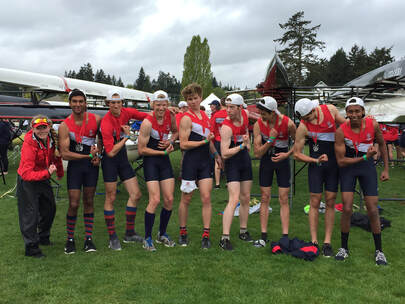 Adam Rockett, forth from the left Adam Rockett, forth from the left When we first moved to Seattle, it was very difficult for our children to make friends at school as we moved in the middle of the school year. That first summer, Adam did the Learn to Row Camp and loved it! It was the first time we saw him truly smile since we moved to the area. The following fall, he became a Novice rower, where he trained with Coach Simon and made some like-minded friends who were good students, passionate rowers, and knew how to have a good time. After that, he became an experienced rower with Coach Steven Freygang and then in his senior year, with Coach Dennis Ferrer where he took the LtWt 8+ all the way from Regionals to Nationals, which I believe was the first time the boys sent a LtWt8+ to nationals! The friends Adam made through rowing are still his best friends today. The integrity, teamwork, grit, competition and mentoring he received from the SRA rowing program has shaped the man Adam has become today as he starts his career right here in Seattle. 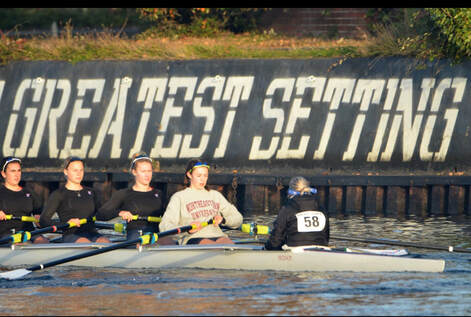 Renee Rockett, six seat (second from left) Renee Rockett, six seat (second from left) Renee watched her brother work hard, be part of a team, and bring home medals. Being a swimmer, she was accustomed to competition but felt like rowing at SRA offered more of a team atmosphere and decided to follow in her brother’s footsteps making the leap to switch sports. Renee caught the competitive rowing spirit and pushed herself during her novice year and earned a place in the Varsity boat her sophomore year. She represented SRA and Washington by competing on the US Rowing team competing in the U17 8+ earning a gold and U17 4+ earning a bronze in Camden, NJ. She has been coached by the best- Molly Lawrence, Marilyn Proby, Kelley Pope, David DeWinter, Nicki Hughes and Dennis Ferrer and so many more leaders at SRA. Their leadership and coaching styles have definitely prepared Renee to be a great student athlete for next fall as a recruited part of the UW rowing team. Not long after Renee started excelling at rowing and became more independent, I found my home to be far too quiet and decided to join the Master’s rowing team as a way to connect with my children, make some new friends, and work on my own fitness level. It was much harder than I thought it would be and I had a new respect for my family and teammates. Being on the novice team and competing at races like Tail of the Lake, Row for the Cure, and Regionals were some of the best memories I will ever have. I think being on the Row for the Cure committee for SRA was one of my proudest moments. Helping to plan a successful event, raise money in honor of my mom who is a survivor, and bring the Pink Erg back to the SRA boathouse were all personal highlights. 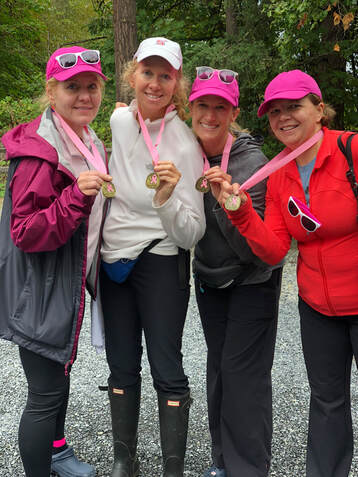 Denise Rockett, second from right, at a Row for the Cure event Denise Rockett, second from right, at a Row for the Cure event Our family certainly appreciates all of the influence and hard work the coaches and staff give to our kids. Volunteering was something I always wanted to do. Whether selling flower baskets back in the day, flipping pancakes in the food tent, or raising money for Coach Appreciation Week four years running, the Rockett family shows up. I quickly realized that by giving I received so much more through the life long friendships I have gained. SRA is truly an extended family for us and we are ever so grateful for all the years we have had at SRA and look forward to an amazing evening at the gala to celebrate the club! |
Archives
April 2023
Categories
|
|
Sammamish Rowing Association
5022 W. Lake Sammamish Pkwy NE Redmond, WA 98052 [email protected] 425-653-2583 |
Mailing Address:
Sammamish Rowing Association P.O. Box 3309 Redmond, WA 98073 |
|

